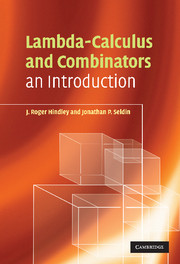Book contents
- Frontmatter
- Contents
- Preface
- 1 The λ-calculus
- 2 Combinatory logic
- 3 The power of λ and combinators
- 4 Representing the computable functions
- 5 The undecidability theorem
- 6 The formal theories λβ and CLw
- 7 Extensionality in λ-calculus
- 8 Extensionality in combinatory logic
- 9 Correspondence between λ and CL
- 10 Simple typing, Church-style
- 11 Simple typing, Curry-style in CL
- 12 Simple typing, Curry-style in λ
- 13 Generalizations of typing
- 14 Models of CL
- 15 Models of λ-calculus
- 16 Scott's D∞ and other models
- Appendix A1 Bound variables and α-conversion
- Appendix A2 Confluence proofs
- Appendix A3 Strong normalization proofs
- Appendix A4 Care of your pet combinator
- Appendix A5 Answers to starred exercises
- References
- List of symbols
- Index
Appendix A4 - Care of your pet combinator
Published online by Cambridge University Press: 05 June 2012
- Frontmatter
- Contents
- Preface
- 1 The λ-calculus
- 2 Combinatory logic
- 3 The power of λ and combinators
- 4 Representing the computable functions
- 5 The undecidability theorem
- 6 The formal theories λβ and CLw
- 7 Extensionality in λ-calculus
- 8 Extensionality in combinatory logic
- 9 Correspondence between λ and CL
- 10 Simple typing, Church-style
- 11 Simple typing, Curry-style in CL
- 12 Simple typing, Curry-style in λ
- 13 Generalizations of typing
- 14 Models of CL
- 15 Models of λ-calculus
- 16 Scott's D∞ and other models
- Appendix A1 Bound variables and α-conversion
- Appendix A2 Confluence proofs
- Appendix A3 Strong normalization proofs
- Appendix A4 Care of your pet combinator
- Appendix A5 Answers to starred exercises
- References
- List of symbols
- Index
Summary
This Appendix was contributed by Carol Hindley to [HS86]. We believe its plain common-sense advice is still very valid despite changing fashions in care, and therefore reprint it here.
Combinators make ideal pets.
Housing They should be kept in a suitable axiom-scheme, preferably shaded by Böhm trees. They like plenty of scope for their contractions, and a proved extensionality is ideal for this.
Diet To keep them in strong normal form a diet of mixed free variables should be given twice a day. Bound variables are best avoided as they can lead to contradictions. The exotic R combinator needs a few Church numerals added to its diet to keep it healthy and active.
House-training If they are kept well supplied with parentheses, changed daily (from the left), there should be no problems.
Exercise They can be safely let out to contract and reduce if kept on a long corollary attached to a fixed point theorem, but do watch that they don't get themselves into a logical paradox while playing around it.
Discipline Combinators are generally well behaved but a few rules of inference should be enforced to keep their formal theories equivalent.
Health For those feeling less than weakly equal a check up at a nearby lemma is usually all that is required. In more serious cases a theorem (Church–Rosser is a good general one) should be called in.
- Type
- Chapter
- Information
- Lambda-Calculus and CombinatorsAn Introduction, pp. 305 - 306Publisher: Cambridge University PressPrint publication year: 2008



